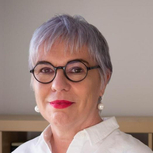07. Februar 2023 Andrea Pető
Andrea Pető is a Hungarian historian and a professor of gender studies at Central European University (CEU). She received the Human Rights Award 2022 of the University of Oslo for her defence of academic freedom and institutional autonomy. The following article is based on her acceptance speech.
Thank you very much for the prize; I am really honored. I am grateful to the institutions, SAR and Kilden, especially Karen Knudsen, Linda Rustad, who nominated me, and to the jury at the University of Oslo who awarded this prize.
This prize is even dearer to me since I seem to be loser three times over. First, I lost my field of gender studies as it was deleted from the list of studies accredited in Hungary. Second, I lost my country, as CEU, the university whose fourth employee I was in 1991, was forced to leave Hungary, a European Union country. Third, I had to resign from the Hungarian accreditation committee after I refused to withdraw my peer-reviewed article on the corruption of Hungarian academic authorization.
You can legitimately ask: Why on earth did the University of Oslo award the prize to this loser?
I want to quote Brecht, who wrote in his 1935 piece, Writing the Truth. Five Difficulties as follows: “It takes courage to say that the good were defeated not because they were good, but because they were weak.”
Why are we so weak today?
In my academic work, I am exploring and analyzing the question, why are we so weak today even though we know that we are the good ones? We are losing, which is not an unfortunate accident. The recent rise of illiberalism and neo-fascism is not a natural catastrophe, it has its reasons and causes. And even earthquakes can be forecasted if one is attentive enough. During earthquakes, some well-built houses withstand the tremor, while others collapse. In my work, I am interested in the reason for our sleepwalking, for our ignorance of the causes and reasons that lead to our becoming weak. And I also want to understand how to put a stop to that: how to build edifices that resist earthquakes.
We can only stop sleepwalking with a culture that comes from education. Education matters because if we fail and sleepwalk into a situation, as we have in the case of Russia, then education will not be enough anymore, and only real weapons and sacrificing human lives can stop evil. Education can only create the culture necessary for ending sleepwalking if academics and researchers are able to speak the truth in a way that can be heard. The present academic evaluation system with nontransparent impact factors and managerial teaching deliverables is not encouraging us to tell the truth. And especially not for a wider audience. That many progressive and critical thinkers failed to speak the truth in a way that can be listened to and understood by many led to the current series of overlapping crises.
It is not enough to simply do our job anymore
One such crisis resides in the fact that academia and higher education became a warzone, of which gender studies is the first battlefield. Whatever happens with gender studies, it will influence the future of higher education, the ways in which knowledge is produced, shared and evaluated. I disagree with the claim that changing this self-centeredness of academia would be hopeless, but it is more challenging now in a hostile environment. Let me quote Brecht again: “Even the hangmen can be addressed when the payment for hanging stops, or when the work becomes too dangerous.” Even the hangman can be recruited at the right historical moment but only if we are cunning enough to recognize the historical moment and proceed in a way that can be attractive – even for the hangman.
It is not enough to simply do our job anymore, we need to be cunning because the institutional framework we blindly trusted to safeguard the values we hold dear is no longer protecting us, but is captured by illiberal forces. The new means of communication which meant to disseminate ideas of freedom and be available for everybody are constructing vulnerable, exploited, and hateful individuals, the unashamed citizens, who had been behind different horrific events in human history. The discussion about academic freedom often falls into the dark hole of what others and other institutions should be doing instead of asking the question of what we can do as academics in higher education.
I was awarded this prize, but I am not the only one who is awarded it. Visible and not visible faculty and staff are doing the right things at the right moment: cunningly building networks and building resilience. As the illiberal forces capture institutions, our strength is in these invisible networks, thanks to which resistance can come from unexpected places.
In order to work, you need to win over the hangman first
As an example of resistance coming from unexpected places, let me finish by honoring the memory of Andrea Kozary, a dear friend and colleague of mine from 1987 who fought for academic freedom in Hungary in 2020. She was a historian and professor with an extensive publication list at the University of Public Administration, which is a flagship institution of illiberal state. She did everything that she could. She has cunningly taught generations of students and pioneered research on hate crime at a university that is the citadel of illiberal politics. When in 2019 she hosted at the University of Public Administration an international conference combatting homophobia, the dean banned the event and the dissemination of the invitation to the students. Andrea met the dean in the cafeteria and made him liable for his decision. The next day Andrea was suspended and fired for allegedly undermining the reputation of the university by organizing a conference. After being fired, Andrea got cancer and died in 2020. Her son executing her last will continued the labor court case, which concluded with a verdict last month.
Andrea Kozary posthumously won the case and gained compensation for her loss of salary for the past three years. This speech is a tribute to a brave colleague illustrating that academic freedom is a practice that requires individuals who are writing, telling, and doing the truth, no matter what risk is involved. Also, institutions are needed, as institutions are the backbone of a functioning democracy, but in order to work, you need to win over the hangman first. As Andrea Kozary was the first person who lost her job and her health for supporting LGBTIQ community in Hungary I would like to dedicate this prize to her memory. Thanks again.
Zitation: Andrea Pető: Writing, telling and doing the truth at risk, in: blog interdisziplinäre geschlechterforschung, 07.02.2023, www.gender-blog.de/beitrag/truth-at-risk/, DOI: https://doi.org/10.17185/gender/20230207
Beitrag (ohne Headergrafik) lizensiert unter einer Creative
Commons Namensnennung 4.0 International Lizenz




